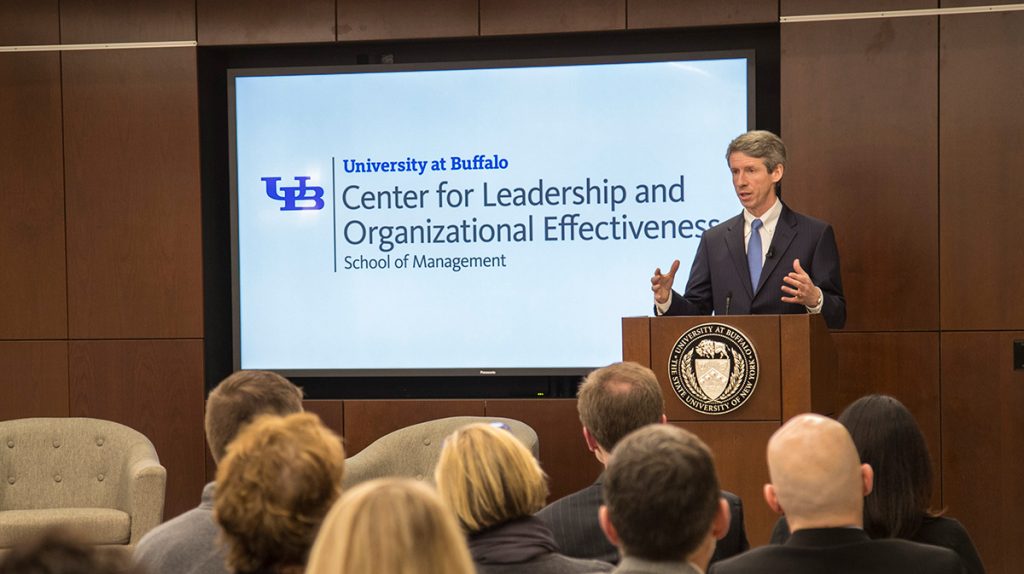
Moog CEO offers his advice for current and future leaders

How much of our good fortune is pure luck — moments over which we have no control? On the flip side, how much of our luck do we make ourselves, by preparing appropriately and seizing opportunities as they come?
That’s what John Scannell, chairman and chief executive officer of Moog, explored in his opening remarks this spring as part of the Leaders on Leadership Speakers Series, hosted by the University at Buffalo School of Management’s Center for Leadership and Organizational Effectiveness.
Reflecting on his upbringing and career, the Irish-born executive said he was lucky to have caring parents who gave him confidence to pursue his goals. “I had the gift of education, health and concentration, and opportunity,” he continued. “I was also very lucky through my career to have three or four bosses who were supportive and encouraging. They really shaped the way I developed.”
From there, Scannell made his own luck, taking risks to grow as a leader. In 1990, he joined Moog, a public company that designs and manufactures products for the aerospace, automotive, defense, energy and medical device industries. Since then, he’s moved from Ireland to Germany and back again, finally relocating to the United States in 2003 to serve as the Boeing 787 program manager at Moog. He was named chief financial officer in 2007 and promoted to president and chief operating officer in 2010. Today, as chairman and CEO, he leads an organization well-known for its innovative, creative and employee-focused company culture.
The following is an excerpt of Scannell’s leadership advice from his UB presentation.
“Leadership is all about people. So, as you’re going into leadership roles, build relationships up and down the organization. When somebody comes into a new job, the first thing you should do is build your team. And, after you build your team, go home and take the rest of the day off.”
“Always hire on aptitude and attitude, not skill, not experience. Hire on pure talent — the ability for somebody who wants to do something to [accomplish] it because they have the aptitude and a positive attitude.”
“To become indispensable, leaders have to make themselves dispensable. If you want to progress in an organization, you’ve got to make sure there’s someone behind you who could step into your job. Some people feel if they hold onto a key piece of knowledge, you can never be let go — and that’s true, but you can never move up either because they cannot replace you. Every time I’ve ever been in a job, the day I started I was looking for my successor, not because I wasn’t interested in the job or was focused on the next job. It just seemed like the logical thing to do. It’s just part of leadership.”
“People have different jobs, but not different values. There can be no little people — and no big people — in an organization. Everybody makes a difference, everybody has worth. It just happens that I have my title and you have a different title.”
“What’s the difference between a manager and a leader? I can make you a manager; I can give you an office, a title and so on. I can’t make you a leader; the only people who can do that are your followers. If people aren’t willing to follow you, you can’t ever be a leader. That’s what so important about leadership — that people respect you and feel like they’re willing to follow you. Particularly when you change jobs or change countries, if people won’t follow you, then you have no chance.”
“Understand yourself, your goals, your values and principles. Clayton Christensen, who is a professor at Harvard Business School, was talking about his career and said, ‘I’ve found it’s easier to stick to your principles 100% of the time than 98% of the time.’ As you go through business, you’ll always find difficult situations, but remembering what you stand for is really important.”
“Make a plan. We talk about strategy in business, but strategy for life is also a good way to find out what you really want to achieve. Although it wasn’t planned, I did this step back in 2002 when I was presented with an opportunity to come to the U.S. We were living in Ireland, faced with that possibility, and I ended up on a long flight and wrote a letter to my wife that said, ‘Here are all the things I hope will happen if we do this’ — kind of a set of broad objectives.
If you have the luck to be alive in 20 years, and you look back, what do you want to say about what you did? For me, what was really important were things like my children growing up and knowing me — that I read them bedtime stories and coached their soccer team, and they knew who their dad was, felt like he was a friend and liked him when they became adults. And, I’m glad to report that we have two lovely children. I wanted to have a strong relationship with my wife, and I wanted to do things in business, to create something. Once you put the plan together, invest your time in the things you think are important. So often, I don’t think we invest enough time in family and friends and things that are actually really important, and when we wake up years later we discover that while we’ve been wildly successful in something, we haven’t invested time in what really matters. Time is the only thing we have to invest.”
“A bonus piece of advice I’ve learned along the way: The most powerful instrument in business today is a handwritten note. How many people here recently received a personally handwritten note from somebody, not a Christmas card where someone just wrote their name? I don’t do it as often as I should, but I’ve had folks come back 20 years later and say, ‘I still have that note you wrote.’ It is incredibly powerful.”
